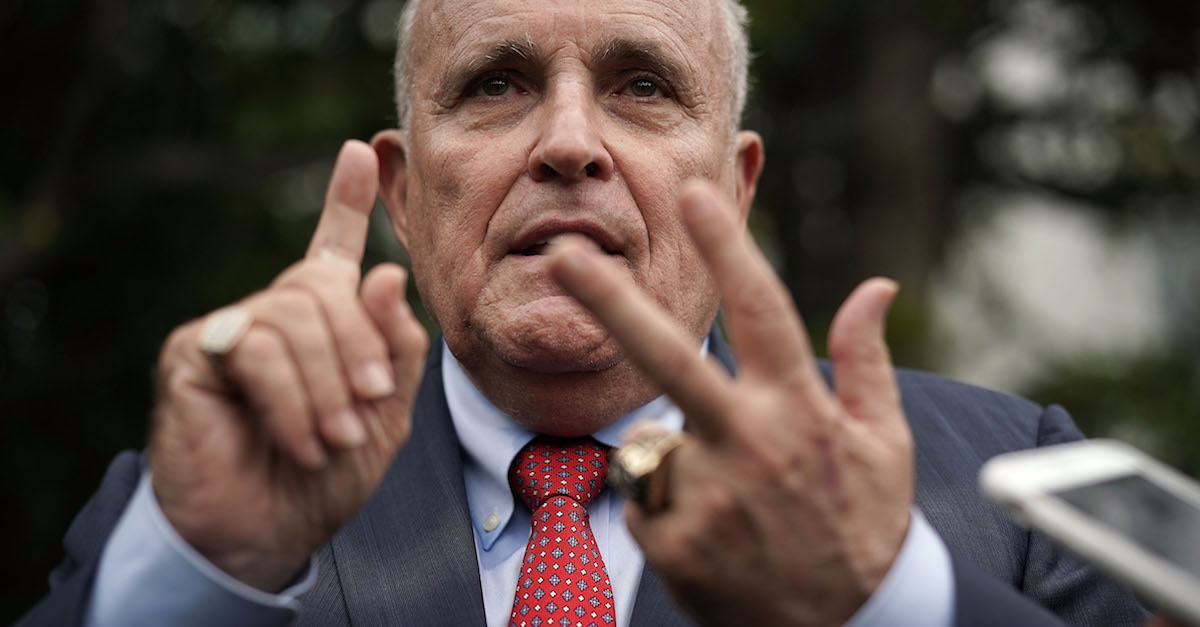
President Donald Trump‘s attorney Rudy Giuliani has been pretty forthcoming about the fact that he and Paul Manafort’s attorneys have discussed how cooperation has been going with Special Counsel Robert Mueller. While Manafort and Trump do have a joint defense agreement in place (as Trump has with others), questions have been raised as to whether inappropriate communications have been going on behind the scenes, and what the consequences of this might be.
Another question that’s been raised is whether Giuliani’s comments, such as the ones he made Tuesday in the New York Times, have imperiled both himself and Manafort’s legal team.
As CNN legal analyst and attorney Ross Garber told Law&Crime, joint defense agreements like this one are not improper per se, but there are “substantial potential perils to providing information pursuant to a common interest agreement while cooperating” — which Manafort was doing until he wasn’t.
Garber said that “prosecutors usually take a dim view of such agreements” and that many of them “believe you are either on Team USA or not. ” Given that a prosecutor might already regard such an arrangement as suspect, that prosecutor (Mueller in this case) might be interested in knowing whether the lawyers have gone too far when it comes to sharing information.
“[D]uring the course of cooperation, a person might learn information from the government or get a sense of its strategy. Sharing this information with another party might cross the line into conduct the government would consider obstructive or at least incompatible with cooperation,” Garber said. “I have seen lawyers themselves become subjects or targets under these circumstances.”
Here’s where Rudy Giuliani’s New York Times remarks come in. Per the Times:
Rudolph W. Giuliani, one of the president’s personal lawyers, acknowledged the arrangement on Tuesday and defended it as a source of valuable insights into the special counsel’s inquiry and where it was headed. Such information could help shape a legal defense strategy, and it also appeared to give Mr. Trump and his legal advisers ammunition in their public relations campaign against Mr. Mueller’s office.
For example, Mr. Giuliani said, Mr. Manafort’s lawyer Kevin M. Downing told him that prosecutors hammered away at whether the president knew about the June 2016 Trump Tower meeting where Russians promised to deliver damaging information on Hillary Clinton to his eldest son, Donald Trump Jr. The president has long denied knowing about the meeting in advance. “He wants Manafort to incriminate Trump,” Mr. Giuliani declared of Mr. Mueller.
So, Giuliani has been gaining insights from Downing and using that to help Trump mount a smear campaign against the Mueller investigation; the same smear campaign that Mueller may already view as obstruction? It’s worth noting that both Giuliani and Trump wanted no part of answering Mueller’s obstruction questions.
We do not know how much or how often Downing filled in the gaps for Trump’s legal team, but it was reported that what he had to say let Trump know Manafort had not “implicated the president in any possible wrongdoing.”
Garber said that Giuliani’s “sharing of otherwise privileged information that he obtained from Manafort’s lawyers is odd and seemingly unwise.” He said it is not clear at this time if the information was subject to privilege.
“It appears Manafort’s lawyers simply conveyed info about what they themselves (as opposed to their client) witnessed,” Garber said. “No privilege protects lawyers themselves from having to testify about what they saw and heard if it wasn’t conveyed by their clients.”
As a result, Giuliani and Manafort’s lawyers could theoretically turn into Mueller witnesses.
Even if there was privilege, Garber said, that is “usually waived if the info is disclosed to a third party,” such as the New York Times.
“Rudy risked this by providing info to the press,” Garber said, adding that if “Rudy and Manafort’s lawyers were communicating with the purpose of getting their clients’ stories straight or interfering with the investigation, this does raise serious obstruction issues. ”
Shanlon Wu, who was the criminal defense attorney for Manafort associate Rick Gates and is also a CNN legal analyst, told Law&Crime that if he was the prosecutor in this case, he would be inclined to speak to the lawyers involved in this joint defense agreement as witnesses.
He also said the arrangement was “questionable ethically” and speculated it could “convert Trump’s legal team into witnesses to potential obstruction.”
“It’s so rare in my experience to have such an arrangement that were I the prosecutor and thought the cooperator was lying and speaking with other defendants’ counsel then I would be worried they were getting direction from the other lawyers,” he said. “So, I’d want to speak to the other lawyers as witnesses.”
It is notable that Downing did not reply to the Times’ request for comment. Nor has he responded to Law&Crime’s request for the same. Giuliani, for his part, has said of the arrangement with Manafort’s team, “We discuss things that are appropriate.”
[Image via Alex Wong/Getty Images]
Have a tip we should know? [email protected]